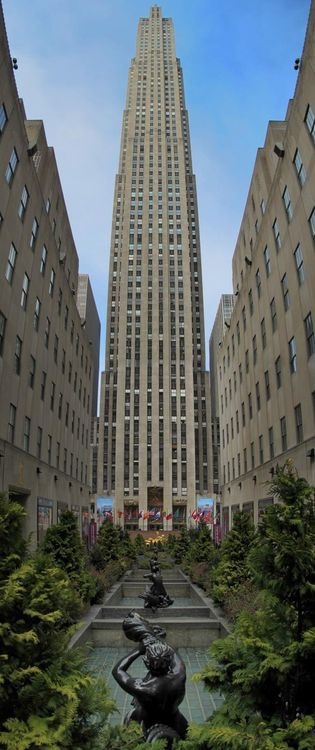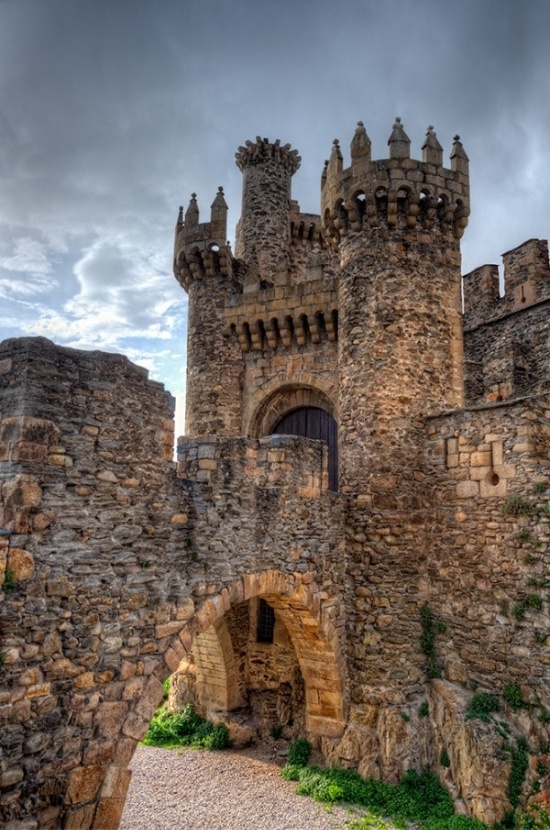Empire State Building
No visit to New York City would be complete without a stop at this masterpiece of Art Deco design, perhaps the most famous office building in the world. From its magnificent lobby — now sporting a re-creation of its original spectacular ceiling mural — to the 86th-floor observatory perched more than 1,000 feet (305 meters) above the city streets, this National Historic Landmark gives visitors plenty to admire. Open past midnight 365 days a year, it’s a romantic spot for a late-night kiss. And on a clear day, the view encompasses five states. It's no wonder why this is one of the top places to visit in New York!
Statue of Liberty
A stirring symbol of freedom, the Statue of Liberty has been a beacon in New York Harbor since 1886. With her torch ablaze more than 300 feet (91.5 meters) above the ground, "Liberty Enlightening the World" (the statue’s official name) is only accessible via commercial ferries, which offer amazing vantage points for the perfect vacation snapshot. Once on Liberty Island, free National Park Service tours fill in the details about sculptor-designer Frédéric-Auguste Bartholdi’s copper-sheeted masterpiece.
Ellis Island Immigration Museum
Ellis Island, the portal through which millions of immigrants entered the United States, is a must-see for anyone interested in the personal stories of those who came to America in search of a new beginning. Walk in the footsteps of the nation’s newest citizens as they traveled through the baggage, registry and hearing rooms — in some cases, leaving with new, "American" names. For those whose ancestors made the journey, the American Family History Center offers computerized genealogical records.
American Museum of Natural History
Dinosaur fossils? Check. Theories of evolution? Check. Planetarium space show and IMAX theater? Double-check. At the American Museum of Natural History, more than 32 million specimens and cultural artifacts await exploration. Thanks to its starring role in the film Night at the Museum, ANMH draws enthusiastic young fans eager to see the 94-foot (28.6 meters) blue whale, the fossilized skeleton of Tyrannosaurus rex (the dinosaur that loved to play fetch), and the gum-chewing Easter Island head.
Museum of Modern Art
With an initial gift of eight prints and one drawing in 1929, MoMA’s collection has grown to include thousands of prints, drawings, paintings, sculpture, films, architectural renderings and design objects. The museum’s holdings highlight the best of modern and contemporary art, showcasing the evolution of artistic expression through the 20th century and into the 21st century. Here you’ll find famous artworks by Pablo Picasso, Henri Matisse, Claude Monet, Vincent van Gogh and Andy Warhol, to name but a few.
The Metropolitan Museum of Art
Known simply as "the Met," this museum offers an unparalleled view of the world, all under one roof. Its wide-ranging collection includes Greek and Roman art, European and Asian paintings and sculpture, artifacts from Africa and the Americas, and more. Of particular note are the ancient Egyptian collection — a special department for the collection was established in 1906 — and the arms and armor holdings, which include examples from both Europe and Japan. In total, the Met's collections include more than two million works of art that span over five thousand years of history.
Guggenheim Museum
Known as much for what’s on the outside as what’s on the inside, the Guggenheim Museum is simply stunning. Architect Frank Lloyd Wright’s revolutionary mid-20th-century design resulted in one of the most recognized buildings in the world. Inside, an exemplary gathering of modern and contemporary art awaits. The collection, originally conceived by business magnate Solomon R. Guggenheim, showcases works by Camille Pissarro, Vasily Kandinsky, Jackson Pollock and Willem de Kooning.
Rockefeller Center
Whether it’s peeking in on NBC’s Today show, cheering for Radio City Music Hall’s dancing Rockettes, or spinning on an ice rink presided over by Prometheus himself, visitors to Rockefeller Center have plenty to do. After taking in the sights below — and exploring some of the 24 acres (9.7 hectares) of underground shops and restaurants — those wanting a different view head to the Top of the Rock® observation deck. Perched more than 800 feet (244 meters) above ground level and spanning three floors, the deck offers 360-degree views of the city.
Central Park
Thought of as the city’s playground, Central Park covers 843 acres (341 hectares) and is located in the heart of Manhattan. Offering a welcome respite from the hustle and bustle of the city streets that surround it on all sides, the park is a refreshing year-round sanctuary. Visitors can walk, run, ride bicycles, play chess and checkers, ice skate, and even fish. Designated quiet zones accommodate those seeking tranquility, while the 21 playgrounds are a boon for families with children who need to move.
Times Square
Located at the intersection of Broadway and Seventh Avenue, Times Square is always busy. On New Year’s Eve, a million people swarm the square, waiting hours to watch the famed ball drop. Daily, thousands come in search of half-price Broadway show tickets, to people watch, or just stand, jaws dropped, to admire the 37-foot-high (11.3 meters) NASDAQ sign — the largest LED sign in the world. Neon-gazing became even safer for pedestrians in 2009, when the heart of Times Square — Broadway, between 42nd and 47th streets — was closed to vehicular traffic.
9/11 Memorial
The 9/11 Memorial honors the thousands of people killed in the attacks on September 11, 2001 and those who died in the World Trade Center bombing in 1993. At the Memorial are twin reflecting pools sitting in the footprints of the Twin Towers that are each nearly an acre in size. Surrounding the pools are the names of every person who died in the attacks inscribed in bronze. Seeing this memorial for yourself can have a profound effect on your visit to New York.





























